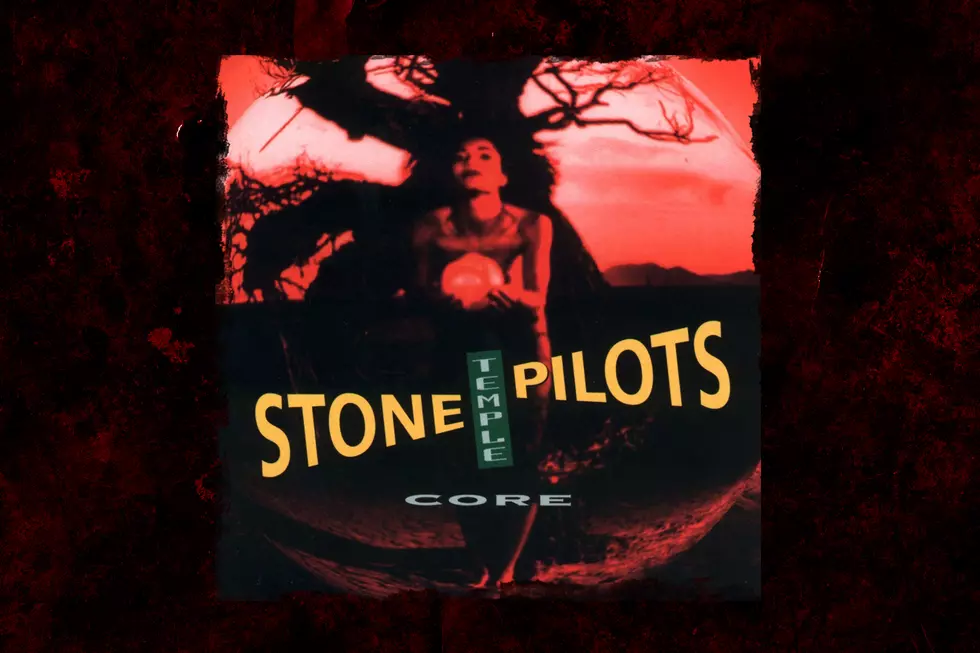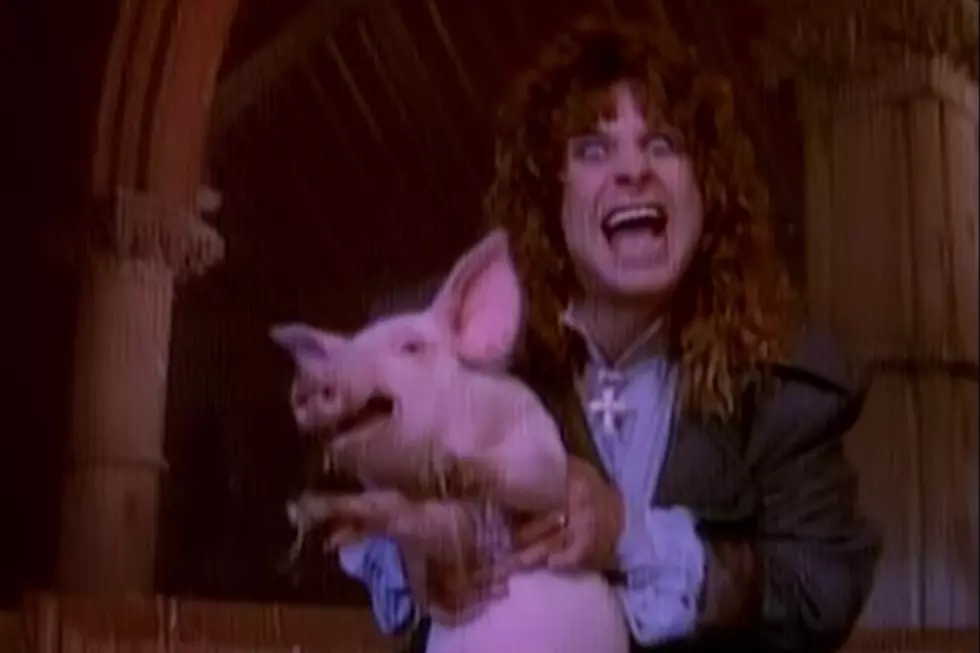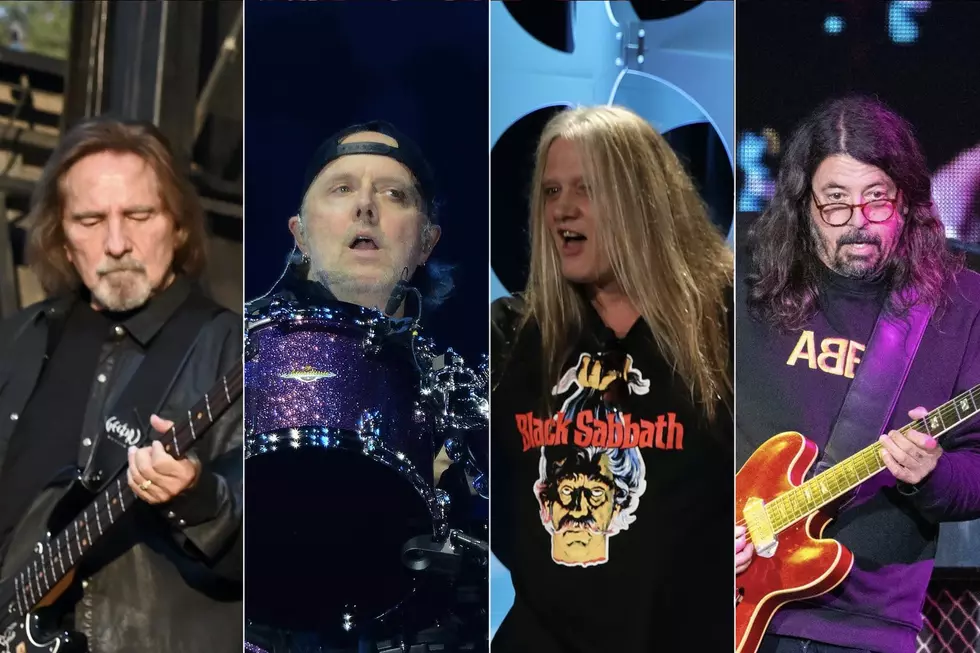
31 Years Ago: Stone Temple Pilots Make Their First Impression With ‘Core’
As 1992 arrived, the explosion of "grunge" was hitting new heights and a new band from SoCal was ready for their turn in the spotlight. A four-piece featuring bassist Robert DeLeo, guitarist Dean DeLeo, drummer Eric Kretz and a charismatic vocalist named Scott Weiland had just taken the name Stone Temple Pilots after forgoing their previous moniker Mighty Joe Young due to a potential legal conflict. On Sept. 29, 1992, the band arrived on the scene by releasing their debut disc Core.
The Stone Temple Pilots story starts several years earlier, as the DeLeo brothers left their home base in New Jersey, with older brother Dean getting a job offer in California and briefly giving up music. "This was in probably '85. I moved out in '84. He was into this job. I think that around '87 he got the urge to get some equipment again," Robert DeLeo told KNAC. "I had gotten some inheritance money from our dad passing away. He passed away when I was a year old. So I got about $15,000 when I was 21. I sunk it all into a home studio. So I had a home studio in an apartment in Long Beach, and started really getting into recording and engineering and writing songs ... This was around '86 I guess, because that's when I met Scott. He came over with the band that he just broke up with and asked if I could record some songs for the new band he was forming. I started recording some songs for him, and then he asked me to play on the songs, and then he asked me to join his band."
"I told him that if he wanted to do something, I wanted to do something, but that we should go do something else," said DeLeo. "It was tough for him because [the other band members] were his friends. We had gotten Eric out of the paper. He was playing with us for a while. I really wanted to keep him, I liked his playing, and we played well together, and I loved Eric as a person."
The final piece of the puzzle was getting Dean back into the fold. "We coerced Dean into picking his guitar up out of the attic and strapping it back on again," Weiland told RIP Magazine. "He had become disenchanted with the music thing and let it go, but we talked him into it. We tied him down and tickled him under his arms."
The guitarist was located in San Diego, while the other three members were up in Los Angeles at least for a while in their infancy. "I was a master at holding the phone between my knees and playing a guitar into it," laughed Dean during Loudwire's interview with the guitarist. "That’s how we wrote a lot at this time. I was living in San Diego and those guys were up in L.A. and I was just like, 'Listen to this part I have!' I’d play it into his phone and 'I got a cool thing for that.' That’s how a lot of the stuff got thrown around until we all got into a room where we were really able to flesh it out."
The group eventually did flesh things out, before settling into the Rumbo Recording Studio, a place owned by the Captain and Tennille's Daryl Dragon, where they started to record the album. "It took three weeks to record," recalled Scott Weiland to Metal Hammer. "There's no point in wasting time on overproducing. At the end of the day it's only music, you see. And that's where your gut feeling kicks in."
The vocalist went on to add that they had worked on some "sick mental poems that do not have any significance for people outside myself or the band," but little did he know that those songs would definitely make a connection. "Some songs may deal with social and political subjects. Kind of a cause/effect relationship within the lyrics," said Weiland. "[It's] personal stuff. I'm not much of a preacher, teacher or politician, because I'm not in a red, white or blue suit."
The first song they recorded was the brief track "Wet My Bed," which came from an improv session between Weiland and Robert DeLeo. The song became notable to fans due to one of those impromptu studio moments that turns up at the end, with producer Brendan O'Brien walking into the room and then stating, "Alright, now what?" at the end. It didn't take long for the band to answer that question.
As stated, it was a quick turnaround only sweetened by the fact the group had the trusted hands of O'Brien guiding them. "We went into making that record really excited for a lot of reasons and one of the greatest things about my recording career was forging a lifelong friendship with Brendan O’Brien," Dean DeLeo told me. "That is something I would never ever change, man. I learned so much about guitar playing and a certain level of musicianship, recording techniques and really, just Brendan’s whole philosophy which is you can’t overthink this. We’re going to just play and hopefully we capture something. That’s how we approached that record. We set up to play live – we were all in one room. We had speakers in isolation booths and the drums, and Rob and I stood in front of Eric and we just played those songs live."
Stone Temple Pilots, "Sex Type Thing"
Once the album arrived, Stone Temple Pilots enjoyed a steady rise in popularity. With "Sex Type Thing" being the first single launched, one of the early narratives was that the band were pro-feminist, but the bravado of the lyrical content in the song was something that stirred up debate with listeners who may or may not have understood Weiland's lyrical approach. The singer found himself having to defend his lyrical content, telling Rolling Stone that he penned the track from the mindset of a "typical American macho jerk" because he didn't want to sound preachy. "I never thought that people would ever seriously think that I was an advocate of date rape," said the singer. He would also tell Request Magazine, "So many guys are brainwashed as children to fit into these macho stereotypes where they treat women disrespectfully and have this improper view of sexuality. Although that kind of man is one I utterly despise, in a sense I feel both characters are victims."
As for the musical portion of the song, it had a distinctive guitar sound to it, one that Dean DeLeo says came from a Led Zeppelin inspiration. "I wrote that riff because I heard 'In the Light' off of Physical Graffiti. I was playing in front of my house and I happened to be outside, probably picking up after the dogs or something and I had Physical Graffiti on and it was quite loud. It was a beautiful summer day and the windows were down and that lick in 'In the Light' — the “Sex Type” lick — fits right in between it. I was basically hearing the notes in between Jimmy Page’s lick. That’s how I came up with that lick."
While "Sex Type Thing" wasn't a huge radio single (peaking at No. 23 at Mainstream Rock radio), it was in heavy rotation at MTV, playing alongside the likes of some of grunge's biggest acts like Alice in Chains, Nirvana and Pearl Jam, the latter of which the band was often compared to in their early days. But Stone Temple Pilots weren't exactly jumping for joy over the comparisons. "I don’t think there’s any similarities in our bands at all," said Weiland to Rolling Stone. "Not discounting Pearl Jam, but to me they're a modern-day Buffalo Springfield or something, a classic-rock band. I don't mean that in a derogatory sense. We're on a totally different trip," he continued, adding that he was more worried people would lump him in with The Doors whom he'd been listening to fairly regularly during recording of the disc.
Stone Temple Pilots, "Plush"
Though it was a steady climb for the band during promotion of "Sex Type Thing," everything really exploded for them when they issued their second single "Plush." The song was described by Weiland as "a metaphor for a lost obsessive relationship." The track became a monster hit for Stone Temple Pilots, reaching No. 1 at Mainstream Rock Radio and even crossing over to No. 18 on the pop charts. And while the song scorched up the airwaves, it got an extra boost when Weiland and Dean DeLeo appeared on Headbanger's Ball and performed an acoustic version of the track.
"I think that performance, I think what people saw is truly how brilliant of a singer Scott was," Dean told me. "He was obviously not just a rock singer. He has the ability to sing a lot of different things. He was just such a huge fan of country and he was weaned on that kind of acoustic stuff. He was just a great singer man, a really great singer. And I think that’s what’s really shining about that performance. I was just playing some chords, but it was the beauty of his voice — just how rich it was — and his choice of melody and of course his lyrics."
Stone Temple Pilots, "Plush" (acoustic)
By this point, things really started to take off for Stone Temple Pilots, who got one of their first breaks opening for Megadeth. The beginning of the tour was rough for the band, who may not have been a natural fit to open for Dave Mustaine's metal outfit, but the fellow San Diegan had seen something in the band and handpicked them to open the run. “Dave was a real gentleman to us, man. He was very, very kind. He was very loving and very supportive," said Dean DeLeo. “Those early days, no one knew who we were and we were playing arenas opening for Megadeth to people filing in. We’d be on our third song and the place is about only a third full. You’re looking like an 8,000-seat room and there’s like maybe 1,000, 2,000 people there and people are filing in. The people that were in there were like pimple-faced boys with Iron Maiden shirts giving us the finger. It sucked ... but Mustaine saw that night after night and I’m gonna tell you something about Dave. He walked out onstage and the place goes f–king crazy and he grabs the mic and goes, ‘You listen you f–kers, I handpicked this band and they’re my friends. You better show some f–king respect,’ and he walked off. [laughs]”
But as the songs started to take hold and with some sage advice from Mustaine, things started to turn around. "Where there were like, 500-1000 people in there maybe when we were on, by the time ‘Plush’ was out [as a single], they were full," says DeLeo. "The arenas were full. People were singing our songs and it changed dramatically.” He continues, "Very early on when the “Plush” video and single came out — that’s right kids, there used to be videos attached to music — we saw things changing and changing fast. It was at that point where people were starting to buy the record and we could see more and more people coming to the shows and more and more people singing every song. I’ll tell you man, that is a very, very moving and loving beautiful experience. We’re all in it together."
Stone Temple Pilots, "Wicked Garden"
The band continued to dig deeper into Core with their third single "Wicked Garden." "There’s a good example of Robert and I each having parts and bringing them together. Robert had the intros and the chorus and I have this verse and it was one of those things that just we brought together. I think he actually put that together at my house," recalls Dean of the track. Weiland added his lyrical touch to the song, offering his take on the loss of innocence and purity, and radio ran with the track which while it didn't replicate the "Plush" success, it certainly did well and helped further cement their reputation as one of rock's great new acts.
Finishing out the singles, the band showed a more somber side with "Creep." This ode to alienation climbed up to No. 2 on the Mainstream Rock chart and proved to be a great jumping off point for their follow-up album Purple. "Musically speaking I was thinking about a song along the lines of 'Heart of Gold' by Neil Young, which is in the key of E-minor, the saddest key of all," recalled Robert DeLeo. "Scott was thinking about the lyrics, and at that time in our lives we were struggling very much. What Scott was writing about was a real life situation. Also about me, the thing about the gun. 'Creep' is a very demeaning word. It was one of those instances where we looked at ourselves, looked in the mirror."
Stone Temple Pilots, "Creep"
But while four songs dominated the airwaves, Core was a deep album for fans to embrace. Songs like the forceful opening cut "Dead and Bloated," the religiously motivated "Naked Sunday," the chugging rocker "Sin" and the late album gem "Crackerman" also resonated with listeners, making Core one of the most well-received debut discs in rock history.
The album eventually peaked at No. 3 on the Billboard 200 album chart, and it went on to be certified eight times platinum by the RIAA. "Plush" received a Grammy for Best Hard Rock Performance at the 1994 Grammy Awards, and the group also took home Best New Artist at the 1993 MTV Video Music Awards. Simply put, Core gave Stone Temple Pilots their base in the industry and showed the promise of their great career to come.
Top 90 Hard Rock + Metal Albums of the 1990s
10 Unforgettable Scott Weiland Moments
More From 97.1 KXRX










